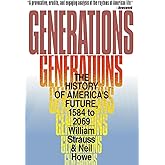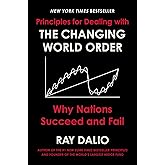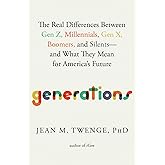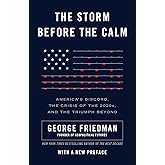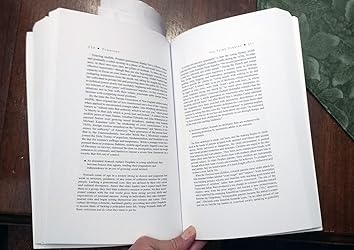
Download the free Kindle app and start reading Kindle books instantly on your smartphone, tablet, or computer - no Kindle device required.
Read instantly on your browser with Kindle for Web.
Using your mobile phone camera - scan the code below and download the Kindle app.

OK
 Audible sample Sample
Audible sample Sample 


The Fourth Turning: An American Prophecy - What the Cycles of History Tell Us About America's Next Rendezvous with Destiny Spiral-bound
The Amazon Book Review
Book recommendations, author interviews, editors' picks, and more. Read it now.
Similar items that may deliver to you quickly
Product details
- ASIN : B09JKZHSKL
- Language : English
- Spiral-bound : 400 pages
- Best Sellers Rank: #2,421,554 in Books (See Top 100 in Books)
- Customer Reviews:
About the authors

William Strauss (February 5, 1947 – December 18, 2007) was an American author, historian, playwright, theater director, and lecturer. As a historian, he is known for his work with Neil Howe on social generations and for the Strauss–Howe generational theory. He is also well known as the co-founder and director of the satirical musical theater group the Capitol Steps, and as the co-founder of the Cappies, a critics and awards program for high school theater students.
Bio from Wikipedia, the free encyclopedia.

Neil Howe is a historian, economist, and demographer who writes and speaks frequently on generational change in American history and on long-term fiscal policy. He is cofounder of LifeCourse Associates, a marketing, HR, and strategic planning consultancy serving corporate, government, and nonprofit clients. He has coauthored six books with William Strauss, including Generations (1991), 13th Gen (1993), The Fourth Turning (1997), and Millennials Rising (2000). His other coauthored books include On Borrowed Time (1988). And more recently Millennials Go to College (2007), and Millennials in the Workplace (2010). He is also a senior associate at the Center for Strategic and International Studies, where he helps lead the CSIS "Global Aging Initiative," and a senior advisor to the Concord Coalition. He holds graduate degrees in history and economics from Yale University. He lives in Great Falls, Virginia.
Customer reviews
Customer Reviews, including Product Star Ratings help customers to learn more about the product and decide whether it is the right product for them.
To calculate the overall star rating and percentage breakdown by star, we don’t use a simple average. Instead, our system considers things like how recent a review is and if the reviewer bought the item on Amazon. It also analyzed reviews to verify trustworthiness.
Learn more how customers reviews work on AmazonReviews with images
-
Top reviews
Top reviews from the United States
There was a problem filtering reviews right now. Please try again later.
I want to emphasize at the outset that this isn't some doom 'n' gloom book that came off the presses after all the calamities we've seen over the past decade. It is, in fact, a fifteen-year old book, and I imagine much of it was written around 1995 or so, during the feel-good Clinton years. When the book came out in 1997, the authors made clear that they were currently in the Third Turning, and that the Fourth Turning - the final quarter of a cycle that they postulate recurs throughout modern human history - was coming around 2005 or so.
Strauss and Howe write:
Over the past five centuries, Anglo-American society has entered a new era - a turning - every two decades or so....Together the four turnings of the saeculum comprise history's seasonal rhythm of growth, naturation, entropy, and destruction:
+ The First Turning is a High; an upbeat era of strengthening instutitions and weakening individualism;
+ The Second Turning is an Awakening, a passionate era of spirtual upheaval, when the civic order comes under attack from a new values regime;
+ The Third Turning is an Unraveling, a downcast era of strrengtening individualism and weakening institutions;
+ The Fourth Turning is a Crisis, a decisive era of secular upheaval, when the values regime propels the replacement of the old civic order with a new one.
As they anticipated the next "Turning", they referenced its start point around 2005, in the middle of the "Oh-Oh" decade (which I've now heard referred to as the "Naughts"):
The next Fourth Turning is due to begin shortly after the new millenium, midway through the Oh-Oh decade. Around the year 2005, a sudden spark will catalyze a Crisis mood...Political and economic trust will implode...severe distress that could involve questions of class, race, nation, and empire...the very survival of the nation will feel at stake. Sometime before the year 2025, America will pass through a great gate in history, commensurate with the American Revolution, Civil War, and twin emergencies of the Great Depression and World War II.
I would suggest, and I'm sure many would agree, that the attacks of 9/11 were the "sudden spark". Early in the book, the authors describe how there have, through human history, been three general ideas about the path of time in our lives - chaotic, cyclical, linear. The entire basis of the book is that the cyclical perception of the world is the accurate one, and the human species continues to move its way through this quartet of cycles, totalling about the length of a human life, called a Saeculum. We are presently in The Millennial Saeculum, which is broken down into these four parts:
+ The American High (1946-1964);
+ The Consciousness Revolution (1964-1984);
+ The Culture Wars (1984-2005?);
+ The Millennial Crisis (which, when the book was published, was yet to arrive)
If you consider the four quarters of a Saeculum to the time "axis" of the grid, the other is made of the human archetypes, whose character depends on their generation as well as what portion of the Saeculum is currently running. The present archetypes are described as follows:
+ The Boom Generation (Prophet archetype, born 1943-1960);
+ The 13th Generation (Nomad archetype, born 1961-1981);
+ The Millennial Generation (Hero archetype, born 1982-?);
+ The Artist archetype is being born now
I'm a member of what they dub the 13th Generation, so-called simply because it is the 13th generation of Americans that they track.
Many of the predictions about the near-future that were offered are eerily accurate, whereas others are embarassingly wrong, such as the supposition that, to celebrate the year 2000, "Others will board a chartered Concorde just after midnight and zoom back through time from the third millennium to the second." Of course, I can't fault the authors for not anticipating the fiery end of the Concorde fleet!
I am, of course, most interested in the Crisis era, since that is supposedly what we're in the midst of living; the authors declare the Crisis can be constructed with this morphology:
+ A Crisis era begins with a catalyst - a startling event (or sequence of events) that produces a sudden shift in mood
+ Once catalyzed, a society achieves a regeneracy - a new counter-entropy that reunifies and reenergizes civic life.
+ The regenerated society propels toward a climax - a crucial moment that confirms the death of the old order and birth of the new.
+ The climax culminates in a resolution - a triumphant or tragic conclusion that separates the winners from losers, resolves the big public questions, and establishes the new order
Here again, I would think most would agree the 9/11 attacks would serve the definition of "catalyst" quite well. As the book draws to a close, it delves into greater detail about what could be forthcoming from the perspective of someone writing in 1997. I've emphasized a few items in bold:
Sometime around the year 2005, perhaps a few years before or after, America will enter the Fourth Turning.....a spark will ignite a new mood...In retrospect, the spark might seem as ominous as a financial crash, as ordinary as a national election, or as trivial as a Tea Party......the following circa-2005 scenarios might seem plausible:
+ A global terrorist group blows up an aircraft and announces it possesses portable nuclear weapons......Congress declares war.....Opponents charge that the president concocted the emergency for political purposes.
+ An impasse over the federal budget reaches a stalemate. The President and Congress both refuse to back down, triggering a near-total government shutdown.....Congress refuses to raise the debt ceiling. Default looms. Wall Street panics.
As superb as these projections were, the authors hasten to add - ironically - "It's highly unlikely that any one of these scenarios will actually happen." On the contrary, these guesses about the future (which, let's face it, required the authors to really go out on a limb) were excellent. They continue (although I am using ellipses to replace large chunks of text, since I'm not in the mood to re-type an entire book):
Time will pass, perhaps another decade, before the surging mood propels America to the Fourth Turning's grave moment of opportunity and danger: the climax of the Crisis.....the molten ingredients of the climax, which could include the following:
+ Economic distress, with public debt in default, entitlement trust funds in bankruptcy, mounting poverty and unemployment, trade wars, collapsing financial markets, and hyperinflation (or deflation)
+ Social distress....
+ Cultural distress......
+ Technology distress, with cryptoanarchy, high-tech oligarchy, and biogenetic chaos
+ Ecological distress....
+ Political distress....
+ Military distress.......
This is a thoughtful, well-articulated, and engrossing book. As with any text that makes broad sociological assertions and generalizations, the authors have opened themselves up to plenty of criticism about the plausibility of their prophecy. Taken as a whole, I think this book provide an enlightening blueprint of both the present and the near-future. I strongly recommend it.
Each turning is led by a generational archetype, also cyclical. The high is led by an Artist generation. The awakening by a prophet generation. The unraveling by a nomad generation. And last, the crisis by a hero generation. The artists of the high are coming to adulthood after a crisis has ended and enjoy their adult years in the best times. As the prophets enter adulthood, they begin to see a more realistic world with problems to come. The nomads enter adulthood in a time when attitudes are beginning to change for the worst and optimism is fading. And then a major crisis occurs, which the hero generation must solve and the cycle is ended.
The authors use historical events in American history to prove the theory. The American Revolution ended almost exactly 80 years before the Civil War ended, and the Civil War ended close to 80 years before World War II ended. So, from that, the authors predicted the next major crisis would occur sometime near 2005, except that is actually less than 70 years after World War II started. Makes sens to the authors. I see some problems with this theory. First, the author ignores some major crises that occurred at the 'wrong' time. The War of 1812 saw the fledgling United States go into its first test and emerge victorious, solidifying itself as a young country, capable of fighting for itself. World War I saw a new country joining allies overseas and emerging as a new world power. The Vietnam Conflict saw American citizens rise up in protest of a war for the first time. Each of those easily fits the qualifications the authors gave for a major crisis; the crisis involved everyone, and the country went into the crisis much differently than it emerged from that crisis after it was over.
What I liked about this book was the authors took important events throughout history and explained them from the point of view of four different generations; the children, the young adults, the mid-life adult leaders, and the elderly. I have never looked at history this way and I found it very interesting. I believe if the authors had written the entire book this way instead of trying to force it into a theoretical cyclical construct it would have been a much better book, and the authors' predictions about the future might have been more accurate.
Strauss and Howe predicted in 1997 that the next major crisis would start somewhere near 2005. You could say that the attack of Sept 11, 2001 was that crisis, but other than the timing, it doesn't really fit the rest of the requirements. While it did involve everyone, at least in our way of thinking about the safety of our country, that really didn't last long and did not change our way of life much at all, even for a short time, except maybe our air travel. And they gave descriptions of the coming generations. While the authors gave fairly accurate descriptions of the baby boomer and generation X generations, they missed badly when talking about the Millenials and Centennials. That's understandable, though, because the oldes Millenials were still teenagers and the Centennials were not quite born yet when the book was written.
So I don't believe the cyclical history is quite right, but I did still like the book because of the way history was described from the points of view of various generations. Very interesting.
Top reviews from other countries
Reviewed in France on February 13, 2022






